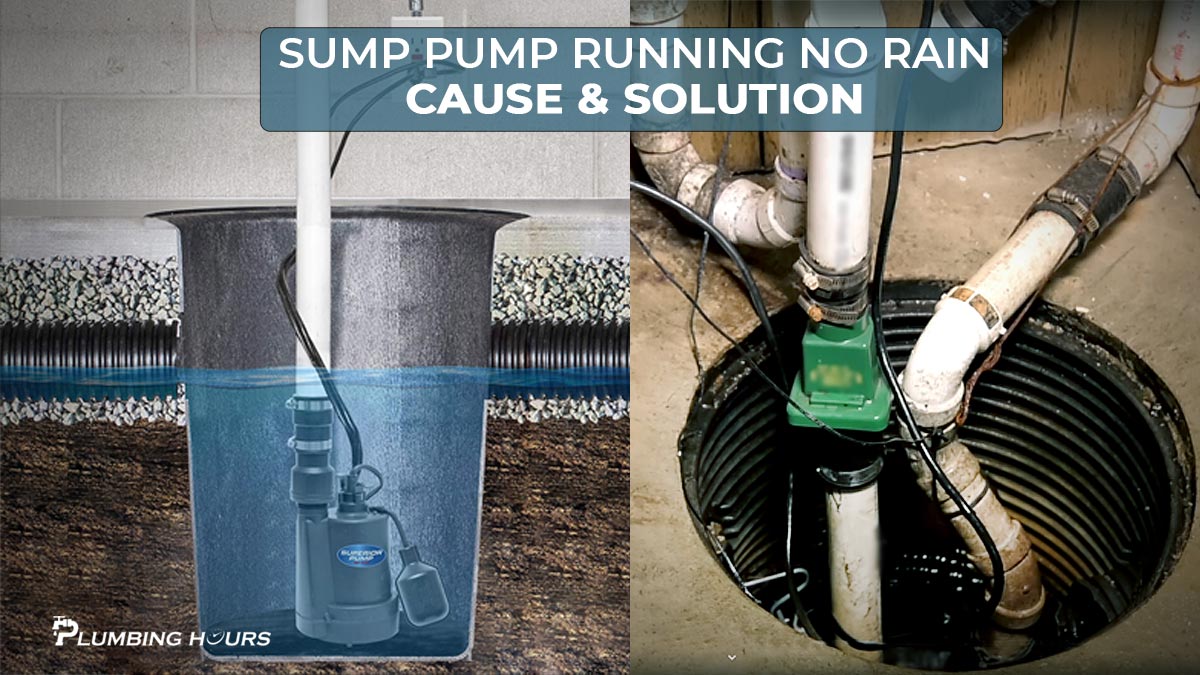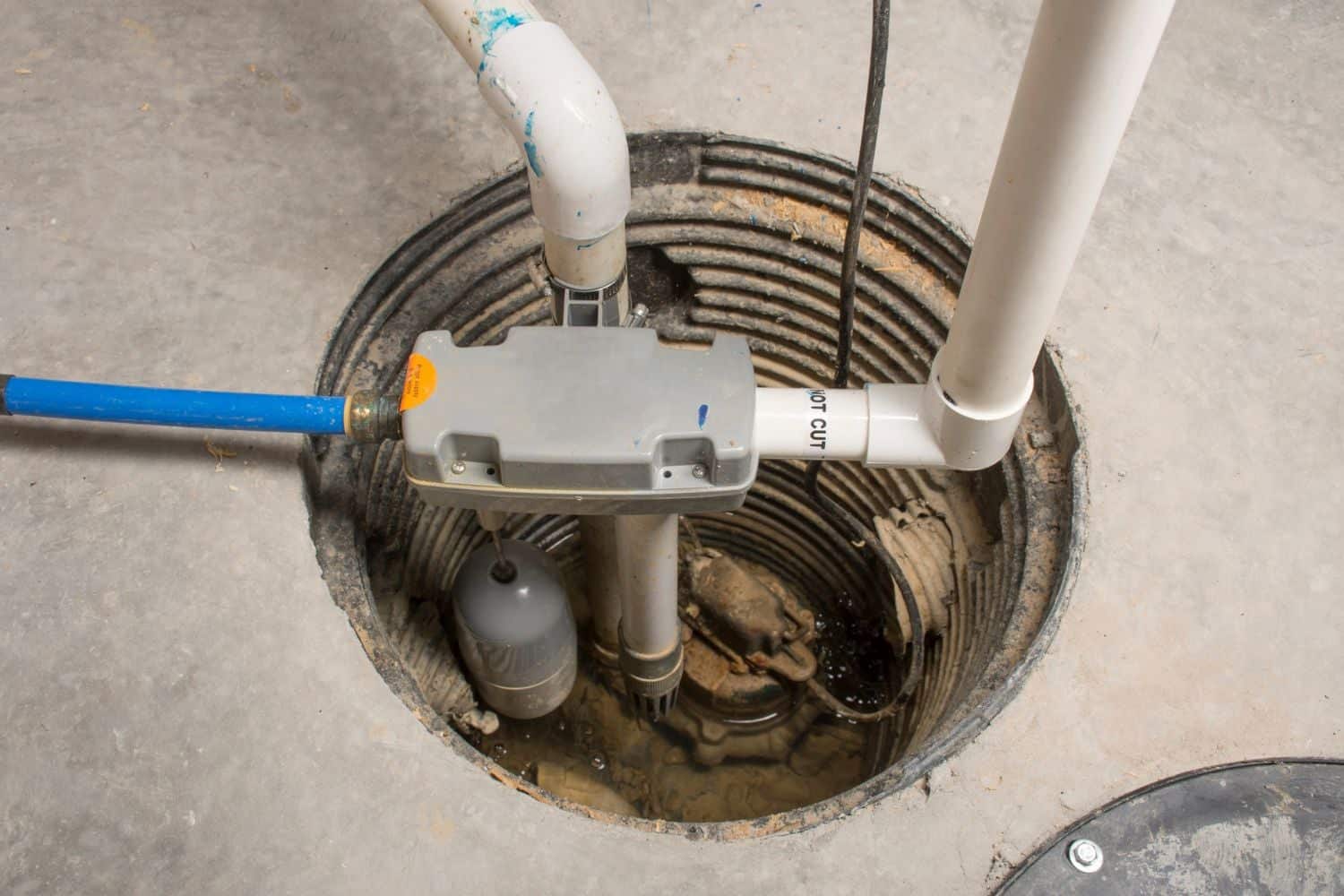Does a Sump Pump Run Even When No Rain
A sump pump is a small, submersible pump that is used to remove water that has accumulated in a water-collecting sump basin. The water is typically pumped out of the basement and away from the foundation of the house.
Sump pumps are often used in homes located in areas with high groundwater tables or frequent flooding. Some sump pumps are also equipped with a battery backup system, so they can continue to operate even if the power goes out.
If you live in an area with a high water table, your sump pump might run even when there’s no rain. The water table is the level at which the ground is saturated with water. If it’s high, that means there’s a lot of water in the ground, and your sump pump might have to work overtime to keep your basement dry.
Sump Pump Runs Constantly and won't shut off, How to Fix That for any pump that plugs in!
Can a Sump Pump Run Continuously
A sump pump is a device that is used to remove water that has accumulated in a sump basin. Sump pumps are commonly used in basements that are below ground level where they are installed in the floor or in a pit.
The sump pump’s job is to move water away from the house to keep the basement dry. There are two types of sump pumps: submersible and pedestal.
Submersible pumps are designed to be placed in the sump basin, while pedestal pumps sit outside of the basin. Both types of pumps have their advantages and disadvantages, but most experts agree that submersible pumps are more reliable and efficient.
Sump pumps typically have an automatic on/off switch that turns the pump on when water levels reach a certain point, and then turns the pump off when water levels fall back below that point. However, some homeowners choose to run their sump pump continuously, even when water levels aren’t particularly high.
There are several reasons why someone might want to do this. First, it can provide peace of mind knowing that your basement is always being protected against flooding, even if there is only a small amount of water present.
Second, running the sump pump continuously can help extend its lifespan since it won’t have to work as hard when it’s only turned on occasionally. And third, continuous operation may be necessary if your basement frequently floods or if you live in an area with heavy rains or snowmelt.
Of course, there are also some downsides to running a sump pump continuously. The biggest one is increased electricity costs – since the pump will be running all the time, it will use more energy than one that is only turned on occasionally. Additionally, continuous operation can put more wear and tear on the pump itself, potentially leading to premature failure.
Sump Pump Running Constantly After Heavy Rain
If you have a sump pump, you may have noticed it running constantly after a heavy rain. This is because the pump is working overtime to keep your basement or crawl space dry.
While this is not necessarily a problem, it can be annoying and cause your electric bill to go up. There are a few things you can do to minimize this problem.
First, make sure that your gutters and downspouts are clean and clear of debris. This will help ensure that water is flowing away from your foundation, and not pooling around it.
Second, check the grading around your home to make sure that water is draining away from the foundation. If necessary, add some gravel or other material to help with drainage.
Finally, consider installing an extension on your downspouts so that water flows further away from your home. By taking these simple steps, you can help reduce the amount of time your sump pump has to run after heavy rains.
Why Does Sump Pump Keep Running With No Rain
If you have a sump pump in your basement, you know that they can be a lifesaver during heavy rains. But what if your sump pump keeps running even when there hasn’t been any rain? There are a few possible explanations for this.
First, it’s possible that the float switch on your sump pump is stuck in the “on” position. This can happen if the switch gets jammed or if there is something blocking it from moving up and down freely.
If this is the case, you’ll need to manually reset the switch. Second, your sump pump might be getting power from an external source, such as a generator or backup battery.
If this is the case, you’ll need to check those devices to make sure they’re working properly. Third, your sump pump could be faulty and needs to be replaced. If you’ve tried all of the above and your sump pump still won’t turn off, it’s time to call in a professional for help.
Sump Pump Pit Keeps Filling No Rain
If you have a sump pump, you know that it’s important to keep the pit clear of debris so that the pump can work properly. But what do you do if your sump pump pit keeps filling up, even when there’s no rain? There are a few possible explanations for this.
One is that your pit may be too small. If it’s not big enough to accommodate all the water that’s draining into it, then of course it will fill up quickly.
Another possibility is that there’s something blocking the outlet pipe from your pit. This could be anything from a clog to a root growing into the pipe.
Whatever the cause, it’s important to get it fixed as soon as possible, or else you risk flooding your basement. If you’re not sure what the problem is, call a plumber or other professional who can take a look and give you an expert opinion.
In the meantime, try to reduce the amount of water going into your pit by diverting runoff away from its location with gutters and downspouts. And don’t forget to clean out your pit regularly so that it can continue to do its job effectively!
Why Does My Sump Pump Keep Filling Up With Water
If your sump pump is filling up with water, it’s likely because the discharge pipe is blocked. The discharge pipe is the pipe that carries water away from the sump pit.
If this pipe becomes blocked, the water has nowhere to go but back into the pit. There are a few things that can cause a discharge pipe to become blocked.
One of the most common reasons is simply because of debris or sediment build-up in the pipe. Over time, this can restrict or even block the flow of water through the pipe.
Another reason why your discharge pipe may be filling up with water is because of an issue with the check valve. The check valve is designed to prevent water from flowing back into the sump pit after it’s been pumped out.
However, if there’s a problem with the valve, it may not be sealing properly and water could be leaking back into the pit. If you’re having problems with your sump pump constantly filling up with water, it’s important to have it checked out by a professional as soon as possible. They will be able to determine what’s causing the issue and make sure that it’s fixed so that your pump can continue to work properly.
How Long Should a Sump Pump Run Per Cycle
If your sump pump is running too frequently, it could be an indication that the system isn’t working properly. If your sump pump is cycling on and off more than once every few minutes, something is definitely wrong.
Sump pumps are designed to cycle on and off as needed to keep your basement or crawl space dry. The ideal cycle time for a sump pump should be around 10 minutes on and 20-30 minutes off.
If your sump pump is cycling more frequently than this, there are a few potential causes: 1. The most common cause of frequent sump pump cycling is a clogged intake screen or inlet pipe.
This can restrict water flow into the pit, causing the pump to run more often in order to maintain the same water level. Check the inlet screen or pipe for any debris that may be blocking it and clean it out if necessary.
2. Another possible cause of frequent cycling is an improperly sized float switch.
If the float switch isn’t set at the correct height, it can cause the pump to turn on and off more frequently than normal. Adjusting the float switch to the proper height should fix this problem.
3. In some cases, a faulty check valve can cause frequent sump pump cycling.
The check valve prevents water from flowing back into the pit after it has been pumped out, but if it’s not working correctly, water can start flowing back into the pit before the Pump has had a chance to turn off. This will cause the Pump to turn back on almost immediately , leading to short cycles. Replacing a faulty check valve should solve this problem .
Sump Pump Runs After Shower
If your sump pump runs after every shower, there are a few possible causes. First, check to see if the float switch is stuck in the “on” position.
This can happen if the float gets caught on something or becomes damaged. If the float switch is the problem, simply replace it with a new one.
Another possibility is that the discharge pipe from your sump pump is clogged. This can happen if debris builds up in the pipe over time.
To clean a clogged discharge pipe, remove it from the sump pit and flush it out with a garden hose. If neither of these solutions solve your problem, you may need to have your sump pump replaced.
Sump Pump Running Every 2 Minutes
If you’ve noticed that your sump pump has been running more frequently than usual, it’s likely because the rainy season is upon us. While a sump pump typically runs every few minutes during a heavy rainstorm, you may find that it’s running every 2 minutes or so.
This is perfectly normal and nothing to be concerned about. Your sump pump is designed to remove water from your basement or crawl space in order to keep your home dry and free of mold and mildew.
During a heavy rain, the amount of water coming into your home can be overwhelming for the pump to handle all at once. So, it will cycle on more frequently in order to keep up with the inflow of water.
If you’re concerned about your sump pump running too often, you can check the float switch to make sure it’s not stuck in the “on” position. Other than that, there’s no need to worry if your sump pump is running more frequently than usual during a heavy rainstorm.

Credit: plumbinghours.com
Do Sump Pumps Run All the Time?
Sump pumps are designed to remove water from your basement or crawl space and keep it from flooding. They typically run on an as-needed basis, only kicking on when the water level in the sump pit reaches a certain height. However, some sump pumps are designed to run continuously, and these are usually used in situations where flooding is more likely to occur.
Is It Normal for Sump Pump to Run in Winter?
If you live in an area where the temperature dips below freezing in the winter, it’s not uncommon for your sump pump to run more frequently during this season. This is because the water in your sump pit can freeze, causing the pump to work harder to remove the water.
There are a few things you can do to help prevent your sump pump from running too often in the winter. First, make sure that your sump pit is properly insulated.
You can also use a heating tape or similar device to keep the water in your pit from freezing. Finally, be sure to clear any snow or ice away from your sump pump’s discharge pipe so that it can function properly.
Should There Always Be Water in Sump Pump?
No, there does not always need to be water in a sump pump. A sump pump is designed to remove water that has accumulated in a sump basin, typically located in the basement of a home.
The water is pumped out of the basin and away from the home. If there is no water in the basin, then there is nothing for the sump pump to do.
What Happens If You Run a Sump Pump Without Water?
If you run a sump pump without water, it will overheat and eventually burn out. Without water to cool it, the pump will overheat and the motor will seize up. Running the pump dry can also damage the impeller, which is the part of the pump that moves water.
Conclusion
A sump pump is a device that helps to remove water from an area that is prone to flooding. When there is no rain, the sump pump will not run.

